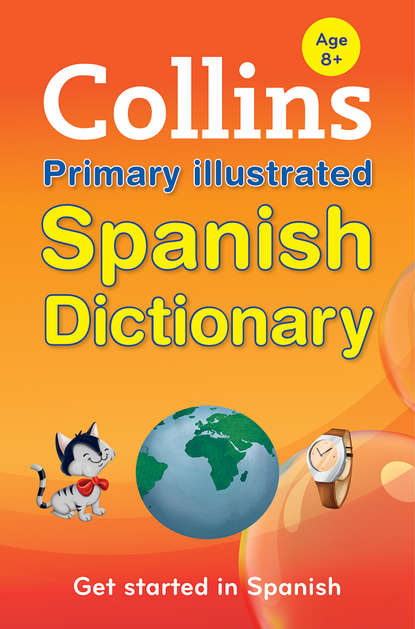
Полная версия:
Collins Primary Dictionaries
la causa NOUN
cause No se sabe la causa del accidente. The cause of the accident is unknown.
a causa de because of
causar VERB
to cause La lluvia causó muchos daños. The rain caused a lot of damage.
cayendo VERB ▷see caer
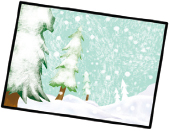
Está cayendo nieve. It’s snowing.
la cazadora NOUN
jacket
la cebolla NOUN
onion
la ceja NOUN
eyebrow
celebrar VERB
to celebrate
el celo NOUN
Sellotape®
los celos NOUN
jealousy Lo hizo por celos. He did it out of jealousy. Tiene celos de su mejor amiga. She’s jealous of her best friend.
celoso (FEM celosa) ADJECTIVE
jealous Está celoso de su hermano. He’s jealous of his brother.
el cemento NOUN
cement
la cena NOUN
dinner La cena es a las ocho. Dinner is at eight o’clock.
cenar VERB
to have dinner No he cenado. I haven’t had dinner. ¿Qué quieres cenar? What do you want for dinner?
Did you know…?
In Spain, people generally eat later than in the UK. Lunch is usually around two and people tend to have dinner around nine or ten.
el cenicero NOUN
ashtray
la ceniza NOUN
ash
centígrado (FEM centígrada) ADJECTIVE
centigrade veinte grados centígrados twenty degrees centigrade
el centímetro NOUN
centimetre
el céntimo NOUN
cent
central (FEM central) ADJECTIVE
central
el centro NOUN
centre un centro comercial a shopping centre
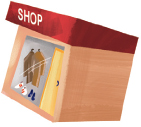
Fui al centro a hacer unas compras. I went into town to do some shopping.
cepillar VERB
to brush
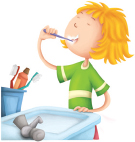
Se está cepillando los dientes. He’s brushing his teeth.
el cepillo NOUN
brush un cepillo de dientes a toothbrush
la cera NOUN
wax
cerca ADVERB
near El colegio está muy cerca. The school is very near. cerca de la iglesia near the church cerca de dos horas nearly two hours Quería verlo de cerca. I wanted to see it close up.
el cerdo NOUN
1 pig
2 pork No comemos cerdo. We don’t eat pork.
el cereal NOUN
cereal Los niños desayunan cereales. The children have cereal for breakfast.
el cerebro NOUN
brain
la cerilla NOUN
match una caja de cerillas a box of matches
el cero NOUN
zero Estamos a cinco grados bajo cero. It’s five degrees below zero. cero coma tres zero point three Van dos a cero. The score is two-nil. Tuve que empezar desde cero. I had to start from scratch.
cerrado (FEM cerrada) ADJECTIVE
closed Las tiendas están cerradas. The shops are closed.
la cerradura NOUN
lock
cerrar VERB
1 to close No cierran al mediodía. They don’t close at lunchtime. Cerró el libro. He closed the book. Cerré la puerta con llave. I locked the door. Se me cierran los ojos. I can’t keep my eyes open. No puedo cerrar la maleta. I can’t shut this suitcase.
2 to turn off Cierra el grifo. Turn off the tap.
la cerveza NOUN
beer
el césped NOUN
grass ‘no pisar el césped’ ‘keep off the grass’
el chaleco NOUN
waistcoat un chaleco salvavidas a life-jacket
el chalet (PL los chalets) NOUN
1 house
2 cottage
el champú (PL los champús) NOUN
shampoo
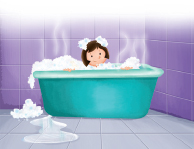
el chándal (PL los chándals) NOUN
tracksuit
la chaqueta NOUN
1 cardigan
2 jacket
charlar VERB
to chat
el chat NOUN
chatroom
la chatarra NOUN
scrap metal
la chica NOUN
1 girl
2 girlfriend Fui al cine con mi chica. I went to the cinema with my girlfriend.
el chichón (PL los chichones) NOUN
bump Me ha salido un chichón en la frente. I’ve got a bump on my forehead.
el chicle NOUN
chewing gum
el chico NOUN
1 boy
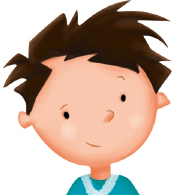
Fueron todos los chicos de la clase. All the boys in the class went.
2 boyfriend Iré con mi chico. I’ll go with my boyfriend.
chillar VERB
to scream
la chimenea NOUN
1 chimney
2 fireplace
la chincheta NOUN
drawing pin
el chiste NOUN
joke El maestro nos contó un chiste. The teacher told us a joke.
chocar VERB
chocar contra to hit/to bump into/to crash into
Language tip
chocar contra has various meanings. Look at the examples.
El coche chocó contra un árbol. The car hit a tree. Choqué contra una farola. I bumped into a lamppost. Chocó contra un muro. He crashed into a wall.
el chocolate NOUN
chocolate
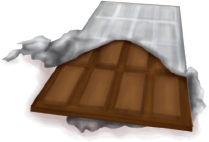
el chorizo NOUN
chorizo
Did you know…?
Chorizo is a kind of spicy sausage.
el chubasquero NOUN
cagoule
chulo (FEM chula) ADJECTIVE
1 cocky
2 cool ¡Qué mochila más chula! What a cool rucksack!
chupar VERB
to suck Se chupaba el dedo. He was sucking his thumb.
los churros PL NOUN
long sweet fritters
Did you know…?
churros are a kind of fritter that people often eat on the streets in a paper bag or order in a café typically with a cup of thick, hot chocolate: chocolate con churros.
el cíber NOUN
Internet café
el cibercafé NOUN
Internet café
el/la ciclista NOUN
cyclist
ciego ciega
ciego can be an adjective or a noun.
A ADJECTIVE
blind Mi abuelo es ciego. My grandfather is blind.
quedarse ciego to go blind
B MASC/FEM NOUN
un ciego a blind man una ciega a blind woman los ciegos the blind
el cielo NOUN
sky No había ni una nube en el cielo. There wasn’t a single cloud in the sky.
cien (FEM cien) ADJECTIVE, PRONOUN
a hundred Había unos cien invitados en la boda. There were about a hundred guests at the wedding.
cien mil a hundred thousand cien por cien a hundred percent
la ciencia NOUN
science Me gustan mucho las ciencias. I really enjoy science.
ciento (FEM ciento) ADJECTIVE, PRONOUN
a hundred ciento cuarenta y dos libras a hundred and forty two pounds Recibimos cientos de cartas. We received hundreds of letters. el diez por ciento de la población ten percent of the population
cierro VERB ▷see cerrar Cuando cierro al puerta hace un ruido extraño. When I close the door it makes a funny noise.
cierto (FEM cierta) ADJECTIVE
true No, eso no es cierto. No, that’s not true.
por cierto by the way
el ciervo NOUN
deer
la cifra NOUN
figure un número de cuatro cifras a four-figure number
el cigarrillo NOUN
cigarette
cinco (FEM cinco) ADJECTIVE, PRONOUN
five Tiene cinco años. He’s five.
el cinco de enero the fifth of January Nació el cinco de enero. He was born on the fifth of January. Son las cinco. It’s five o’clock.
cincuenta (FEM cincuenta) ADJECTIVE, PRONOUN
fifty Tiene cincuenta años. He’s fifty.
el cine NOUN
cinema Mañana voy al cine. I’m going to the cinema tomorrow.
la cintura NOUN
waist ¿Cuánto mides de cintura? What’s your waist size?
el cinturón (PL los cinturones) NOUN
belt el cinturón de seguridad the safety belt
el circo NOUN
circus
el círculo NOUN
circle Dibuja un círculo. Draw a circle.
el cisne NOUN
swan
la cita NOUN
1 date No llegues tarde a la cita. Don’t be late for your date.
2 appointment Tengo cita con el médico. I’ve got a doctor’s appointment.
la ciudad NOUN
1 city
2 town
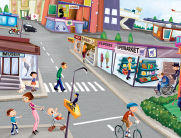
la clara NOUN
white
claro (FEM clara)
claro can be an adjective or an adverb.
A ADJECTIVE
1 clear Lo quiero mañana. ¿Está claro? I want it tomorrow. Is that clear? Está claro que esconden algo. It’s obvious that they are hiding something.
2 light una camisa azul claro a light blue shirt
B ADVERB
clearly Lo oí muy claro. I heard it very clearly. ¡Claro! Of course! ¿Te oyó? — ¡Claro que me oyó! Did he hear you? — Of course he heard me!
la clase NOUN
1 class A las diez tengo clase de física. I have a physics class at ten. Mi hermana da clases de inglés. My sister teaches English. Hoy no hay clase. There’s no school today. clases particulares private lessons
2 classroom
3 kind Había juguetes de todas clases. There were all kinds of toys.
clásico (FEM clásica) ADJECTIVE
classical Me gusta la música clásica. I like classical music.
clasificar VERB
to classify
■ clasificarse to qualify Esperan clasificarse para la final. They hope to qualify for the final. Se clasificaron en tercer lugar. They came third.
la clave NOUN
code un mensaje en clave a coded message
el clic NOUN
click hacer clic en algo to click on something
el clima NOUN
climate Es un país de clima tropical. It’s a country with a tropical climate.
la clínica NOUN
hospital
el clip (PL los clips) NOUN
paper clip
cobarde (FEM cobarde) ADJECTIVE
cowardly ¡No seas cobarde! Don’t be such a coward!
el coche NOUN
car Fuimos a Sevilla en coche. We went to Seville by car. un coche de carreras a racing car los coches de choque the bumper cars un coche de bomberos a fire engine
la cocina NOUN
1 kitchen Comemos en la cocina. We eat in the kitchen.
2 cooker una cocina de gas a gas cooker la cocina vasca Basque cuisine un libro de cocina a cookery book
cocinar VERB
to cook No sabe cocinar. He can’t cook. Cocinas muy bien. You’re a very good cook.
el codo NOUN
elbow
coger VERB
1 to take Coge el que más te guste. Take the one you like best.
2 to catch ¡Coge la pelota! Catch the ball! La cogieron robando. They caught her stealing. He cogido un resfriado. I’ve caught a cold. Voy a coger el autobús. I’m going to get the bus.
el cohete NOUN
rocket
el cojín (PL los cojines) NOUN
cushion
cojo
cojo can be an adjective or a verb.
A (FEM coja) ADJECTIVE
Es algo cojo. He has a bit of a limp.
B VERB ▷see coger ¡Si te cojo! If I catch you!
la cola NOUN
1 tail
2 queue Había mucha cola para el baño. There was a long queue for the toilets.
3 glue
hacer cola to queue
colarse VERB
to push in No te cueles. Don’t push in. Nos colamos en el cine. We sneaked into the cinema without paying.
el/la colega NOUN
1 mate
2 colleague
el colegio NOUN
school
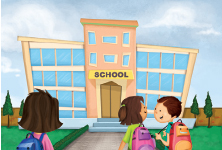
¿Todavía vas al colegio? Are you still at school? un colegio público a state school
colgar VERB
1 to hang Colguemos el cuadro en esta pared. Let’s hang the picture on this wall. ¡No dejes la chaqueta en la silla, cuélgala! Don’t leave your jacket on the chair, hang it up!
2 to hang up ¡No cuelgues! Don’t hang up! Me colgó el teléfono. He hung up on me.
el collar NOUN
1 necklace
2 collar
el colmo NOUN
¡Esto ya es el colmo! This really is the last straw!
colocar VERB
to put Colocamos la mesa en medio del comedor. We put the table in the middle of the dining room. ¡Colocaos en fila! Get into a line!
la colonia NOUN
perfume ¿Qué colonia llevas? What perfume are you wearing?
una colonia de verano a summer camp
el color NOUN
colour ¿De qué color son? What colour are they? un vestido de color azul a blue dress
la columna NOUN
column
el columpio NOUN
swing
la coma NOUN
comma Separa las palabras con una coma. Separate the words with a comma. cero coma ocho zero point eight
Did you know…?
In Spanish you use a comma instead of a point in decimal numbers.
la comba NOUN
skipping rope
saltar a la comba to skip
el comedor NOUN
1 dining room
2 refectory
comenzar VERB
to begin Comenzó a llover. It began to rain.
comer VERB
1 to eat ¿Quieres comer algo? Do you want something to eat? Le estaba dando de comer a su hijo. She was feeding her son.
2 to have lunch Comimos en el hotel. We had lunch in the hotel. Hemos comido paella. We had paella for lunch. ¿Qué hay para comer? What’s for lunch?
Did you know…?
In Spain, people generally eat later than in the UK. Lunch is usually around two and people tend to have dinner around nine or ten.
cometa
cometa can be a masculine or a feminine noun.
A MASC NOUN
comet
B FEM NOUN
kite
el cómic NOUN
comic
la comida NOUN
1 food La comida del hotel es muy buena. The food in the hotel is very good.
2 lunch La comida es a la una y media. Lunch is at half past one.
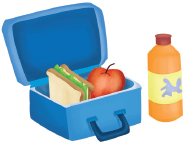
Did you know…?
In Spain, people generally eat later than in the UK. Lunch is usually around two and people tend to have dinner around nine or ten.
3 meal Es la comida más importante del día. It’s the most important meal of the day.
comienzo VERB ▷see comenzar Yo comienzo y después tú me sigues. I go first and then you follow me.
como ADVERB, CONJUNCTION
1 like Tienen un perro como el nuestro. They’ve got a dog like ours. blanco como la nieve as white as snow Es tan alto como tú. He is as tall as you.



